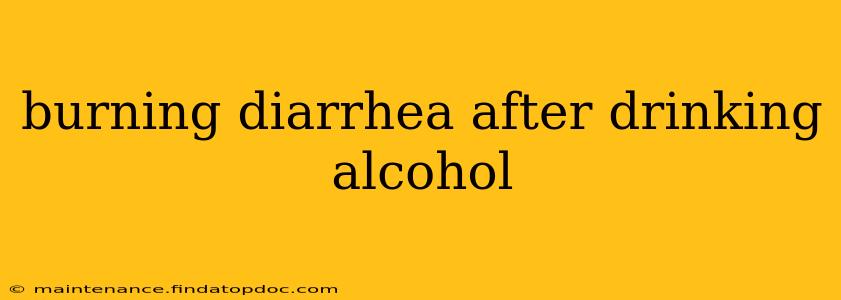Experiencing burning diarrhea after consuming alcohol is an unpleasant and potentially concerning issue. While a mild bout might be attributed to simple alcohol intolerance, more severe or persistent symptoms warrant medical attention. This comprehensive guide explores the potential causes of this distressing condition, effective remedies, and preventative measures to help you manage and avoid future occurrences.
What Causes Burning Diarrhea After Drinking Alcohol?
Several factors can contribute to burning diarrhea following alcohol consumption. Understanding these underlying causes is crucial for effective management.
Alcohol's Irritating Effects on the Digestive System
Alcohol, particularly in large quantities, can directly irritate the lining of the digestive tract. This irritation can lead to inflammation, increased bowel movements, and the sensation of burning during bowel movements. The dehydrating effects of alcohol further exacerbate the issue, leading to more concentrated stool and intensified discomfort.
Increased Intestinal Motility
Alcohol can stimulate the muscles in the intestines, causing them to contract more frequently and forcefully. This accelerated movement of stool through the digestive system reduces the time available for water absorption, resulting in loose, watery stools. This increased motility is also a factor in the feeling of urgency and the burning sensation.
Gut Microbiome Imbalance
Alcohol consumption can disrupt the delicate balance of bacteria in the gut microbiome. This imbalance can lead to inflammation, changes in bowel habits, and increased susceptibility to infections, which can manifest as burning diarrhea.
Underlying Medical Conditions
In some cases, burning diarrhea after alcohol consumption could indicate an underlying medical condition such as irritable bowel syndrome (IBS), inflammatory bowel disease (IBD), or celiac disease. Alcohol can worsen the symptoms of these conditions, leading to more severe digestive distress.
Food Poisoning or Other Infections
While not directly caused by alcohol, consuming contaminated food or beverages alongside alcohol can increase the likelihood of experiencing digestive upset, including burning diarrhea. The alcohol itself may mask early symptoms of food poisoning, delaying appropriate treatment.
How to Treat Burning Diarrhea After Drinking Alcohol
Treatment focuses on alleviating symptoms and addressing the underlying cause. If symptoms are mild and self-limiting, home remedies may suffice. However, severe or persistent symptoms require professional medical evaluation.
Hydration is Key
Dehydration is a major concern with diarrhea. Replenishing fluids lost through frequent bowel movements is crucial. Drink plenty of clear fluids like water, broths, and electrolyte solutions to prevent dehydration.
Over-the-Counter Medications
Over-the-counter anti-diarrheal medications like loperamide (Imodium) can help reduce the frequency and severity of bowel movements. However, these should be used cautiously and only as directed, especially if you have underlying health conditions.
Dietary Adjustments
A bland diet of easily digestible foods such as plain rice, toast, bananas, and applesauce can help soothe the digestive system. Avoid greasy, spicy, or high-fiber foods, as these can further irritate the intestines.
How to Prevent Burning Diarrhea After Drinking Alcohol
Preventing burning diarrhea involves mindful alcohol consumption and lifestyle changes.
Moderate Alcohol Intake
Limit your alcohol intake to moderate levels. The less alcohol you consume, the lower your risk of experiencing digestive distress.
Stay Hydrated Before, During, and After Drinking
Drinking plenty of water before, during, and after consuming alcohol helps to minimize dehydration and its associated digestive issues.
Choose Alcohol Wisely
Some alcoholic beverages are known to be more irritating to the digestive system than others. Consider choosing clear liquors over darker ones, and opting for lower-sugar options.
Be Mindful of Food Choices
Avoid consuming foods known to trigger digestive upset alongside alcohol.
When to Seek Medical Attention
Consult a doctor if you experience:
- Severe or persistent diarrhea: Diarrhea lasting longer than a few days or accompanied by severe dehydration requires medical attention.
- Bloody stool: Blood in your stool indicates a serious problem requiring immediate medical evaluation.
- High fever: A high fever suggests a possible infection.
- Severe abdominal pain: Intense abdominal pain could indicate a more serious underlying condition.
- Signs of dehydration: Symptoms such as dizziness, lightheadedness, and decreased urination indicate severe dehydration and require prompt medical treatment.
This information is for general knowledge and does not constitute medical advice. Always consult a healthcare professional for any health concerns or before making any decisions related to your health or treatment.
